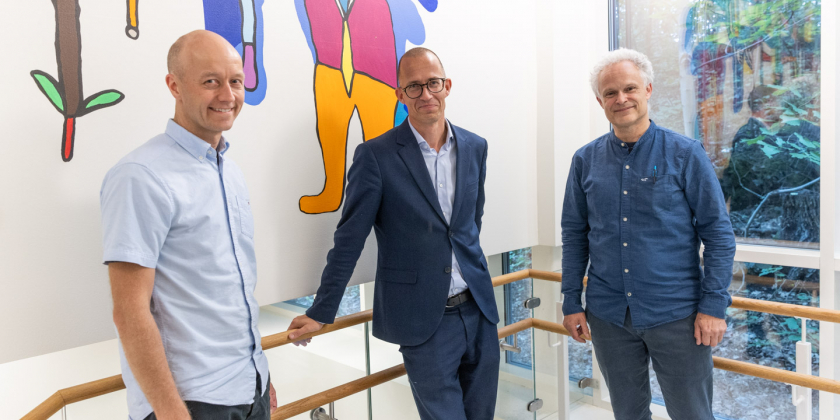Harnessing AI for cancer prevention and treatment
A new project proposes to use the power of artificial intelligence to improve cancer prevention and treatment in Norway.
NEXTMAP is a state-of-the-art project aimed at revolutionising cancer care through advanced artificial intelligence (AI) systems. The project proposal was recently submitted to the Norwegian Research Council by Oslo Cancer Cluster and a wide network of national and international partners.
“NEXTMAP aims to transform cancer care by integrating innovative AI methodologies to predict and manage complex medical events. This endeavor is rooted in the promise of AI to offer more precise and timely interventions, improving patient outcomes while optimising healthcare resources,” said Ketil Widerberg, general manager of Oslo Cancer Cluster.
The multidisciplinary collaboration gathers leading researchers from across Norway, including NTNU, the University of Bergen, Vestre Viken, the Arctic University of Norway, the University of Oslo and Oslo University Hospital, uniting expertise from various fields to foster innovation in cancer research and AI development. International partners include University of Oxford and University of Cambridge.
Predicting the future
The core team consists of Ole Christian Lingjærde, Professor and Head of Scientific Computing and Machine Learning group at University of Oslo, and Tarjei Hveem, PhD, Interim Head of Institute for Cancer Genetics and Informatics, along with Widerberg.
“The project will make use of cutting-edge AI techniques, such as advanced multimodal models for integration of different types of content, transfer learning, multi-agent systems that enable complex problem solving through collaboration of multiple AI agents, and generative AI for content creation. Using AI we will be able to transform a sequence of past health-related events for a patient into a unified representation,” commented Lingjærde.
The primary focus is on enhancing cancer prevention, diagnostics, and treatment, with potential applications extending across various sectors and industries.
“To optimise treatment and follow-up for the individual patients in the future we have to ‘learn from every patient’. In a situation with more and more complex and detailed data from several sources, artificial intelligence will be the answer to that challenge,” commented Sigbjørn Smeland, Head of the Norwegian Radium Hospital.
Using Norwegian data
NEXTMAP involves developing a foundation model for cancer medicine, leveraging extensive hospital records, national cancer registries, public databases, and scientific publications. This foundation model will be capable of considering the impact of medical actions on patients, the healthcare system, and society, even when data is incomplete or multimodal.
“AI by deep learning is a game changer in most fields, including cancer pathology. The new algorithms can automate manual tasks in pathology. They can guide the pathologist in their work. Furthermore, they can perform tasks exceeding pathologists’ routine capacities, such as the prediction of patient survival directly from the routine HE-section. With the digitalisation of pathology in Norwegian hospitals, the potential in AI-supported pathology can finally be realised,” commented Hveem.
According to the proposal, the project will ensure that ethical considerations, data privacy, fairness, and explainability are integral to the AI systems. The project team is committed to adhering to stringent ethical guidelines and regulations.
Full list of project partners with representatives:
- Arctic University of Norway: Therese H. Nøst, Tonje Braathen, Torkjel Sandanger
- Cancer Registry of Norway: Jan F. Nygård, Solveig Hofvind
- Oslo Cancer Cluster: Ketil Widerberg
- Vestre Viken Hospital Trust: Kristine Sahlberg
- NTNU: Mette Langaas, Thea Bjørnland, Pål Sætrom, Åsmund Flobak
- University of Bergen: Leif Oltedal
- University of Magdeburg: Alexander Binder
- University of Oslo: Arnoldo Frigessi, Jim Tørresen, John-Michael Gran, Kai Ellefsen, Kjetil Røysland, Magne Thoresen, Manuela Zucknick, Ole Christian Lingjærde, Valeria Vitelli
- University of Oxford: David Kerr
- University of Cambridge: Sylvia Richardson
- Norwegian Cancer Society
- Oslo University Hospital: Andreas Kleppe, Eivind Hovig, Gunhild Mælandsmo, Inger Nina Farstad, Karsten Eilertsen, Kjetil Taskén, Mads Haugen, Ole-Johan Skrede, Olivier Boissou, Sigbjørn Smeland, Tarjei Hveem, Tero Aittokallio, Torje Vegar Pedersen, Vessela Kristensen, Åslaug Helland












